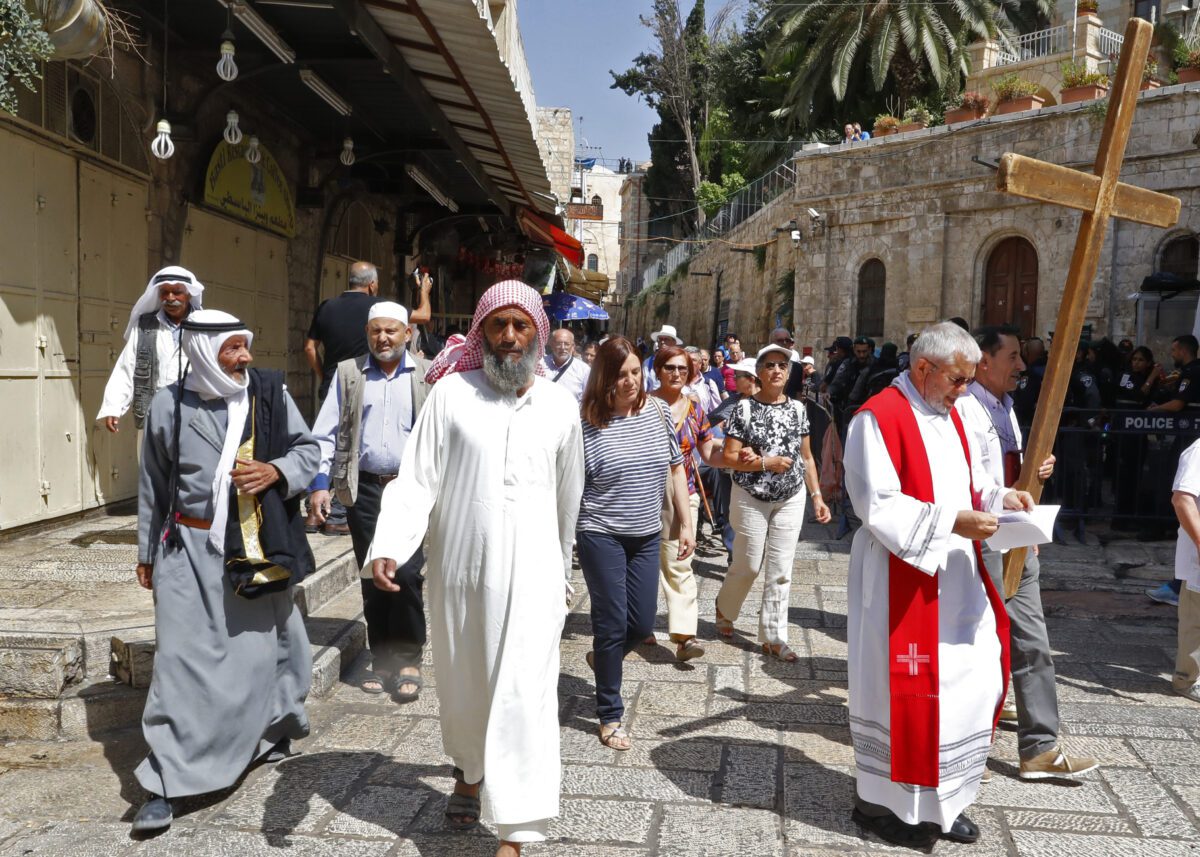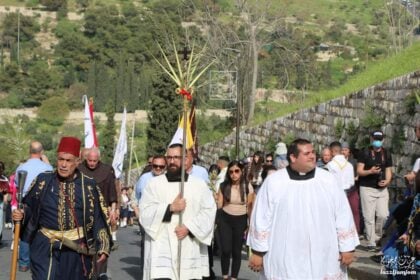
Dana Hourany
For Palestinian Muslims and Christians, this is the season of religious celebrations. The Holy Week for Western Christians began on Sunday, April 10 with the Palm Sunday procession. The joyous march in the streets of occupied Jerusalem was led by clerics and monks clad in their traditional colored robes.
The vast crowd of Christian worshippers filled the streets with their hymns and prayers while holding palm tree branches in their hands. Palestinian Muslims had also taken to the streets a week previously to mark the start of the holy month of Ramadan. Colored fairy lights and traditional lanterns glistened in the corners of Jerusalem’s old city, while musicians and drummers filled the air with celebratory cheers dressed in traditional Palestinian sirwals (baggy pants), striped black and white shirts, the famous Palestinian keffiyeh scarf, and the tarboosh (traditional red hat) on their heads.
Although April 2022 is marked by a convergence of religious customs, with Christians fasting for 40 days during Lent and Muslims fasting for 30 days during Ramadan, celebrations are constantly interrupted due to escalating tensions with Israeli police. During the first days of Ramadan, Israeli troops violently attacked seven people and arrested ten others in the Bab Al-Amoud neighborhood of occupied Jerusalem.
Two Palestinian women were killed by Israeli police in separate parts of the occupied West Bank on Palm Sunday, adding to the score of discriminatory violence that Palestinians face even during months of devotion.
Despite the bloodshed and the looming terror, Palestinians of all faiths, Christian and Muslim, are resolute about making this season one of joy, worship, and tradition.

Ramadan and Islam
Palestinians have become immune to fear, Ahmad, a 34-year-old teacher and father, told Fanack. He asserts that the pervasive and violent presence of Israeli soldiers in every region of the country dictates their existence.
“If I’m going out for fun or going to a place of worship, why should I be surrounded by soldiers? Who are they protecting me from? My own people?” he asked.
Jerusalem’s old city where people from all over Palestine go to gaze at the decoration and dine in the city’s cafes and restaurants, remains the most jubilant, he said. The Aqsa mosque, however, is the most important site for Muslims.
Every year, Muslims clean the mosque’s courtyard in preparation for the holy month and perform the taraweeh – special prayers performed after every evening’s last daily prayer, usually in large masses.
People also assemble around the Aqsa courtyard for their evening meal (Iftar), where food and water are sometimes handed out for free.
Israeli authorities have eased restrictions on West Bank Palestinians this year, allowing them easier access to the holy site – but only for Friday prayer. For Ahmad, these amendments merely serve as a reminder that their lives remain at the mercy of the occupiers.
“As citizens and worshippers, we should have full freedom to access the holy site but we know that we are confined to a prison. The prison guards call all the shots and we simply react to their decisions; we have no say in anything,” he said.
150 Palestinians were injured this week after Israeli police attacked Muslim worshippers attempted to access al-Aqsa for Friday prayers. Hundreds were detained, according to Palestinian rights groups.
Traditions amended
Israel’s occupation continues to affect many Ramadan customs. According to Ahmad, due to ubiquitous Israeli checkpoints and mandatory inspections, family members and friends who regularly exchange dinner invites on a monthly basis find it nearly impossible to meet one another.
The economic repercussions of the Ukrainian-Russian war that hiked prices of commodities and fuel, is another factor. A four-course Iftar has now become a burden to many, Ahmad said.
The musahharati or the drummer that wakes people up for suhoor or the pre-dawn meal, has disappeared in several parts of the country, Ahmad laments.
“We speculate that the Israeli government banned these practices for security reasons, although we don’t fully comprehend what these reasons are.”
Despite the violence, restrictions, and economic hardships, Palestinians maintain their faith and traditions. From group outings to traditional food that adorns dinner tables, such as traditional pickled side dishes, sophisticated meat courses, the widely-loved falafel and Jerusalem kaek (sesame bread), and popular katayef jebne (cheese desserts), there is something for everyone.

Lent and Christianity
Jinan Nassar, a 61-year-old chef and restaurant owner in Ramallah, central West Bank, brings joy to the hearts and homes of Muslims and Christians alike with her traditional home-cooked delicacies.
Ramallah, once a predominantly Christian city, has seen a demographic change in the last decade, with Christians being forced out of their homes and into immigration, resulting in a considerable reduction in their population.
Nassar told Fanack that Lent is important to her faith because it encourages her to resist her cravings for certain foods, allowing her to feel closer to God, and to the poor. Christians abstain from eating meats, fish, eggs, and animal byproducts during Lent, which are all major elements in her cookery. Nassar works from 9 a.m. to 9 p.m. to put together meals for all her community, Muslims and Christians similarly.
For Muslims, the most highly requested dish for Iftar are a combination of rice and lamb meat such as mansaf, stuffed lamb, and makloube. For Christians, it is yalanji (vegan stuffed vine leaves) and rummaniyeh (lentil eggplant stew). This is in addition to many pastries that are baked fresh daily.
Despite rising prices, Nassar insists she will not raise her prices in order to avoid alienating her clients. Her restaurant provides a respite from the stresses of life under Israeli occupation, taking customers on a sentimental journey down memory lane, possibly evoking memories of eating at their mothers’ or grandmothers’ houses, and this is something she refuses to compromise, she added.
For Nassar, the restaurant is also an act of preserving tradition. And so it is part and parcel of Palestinian resistance.
“This is the land of Jesus Christ. It is essential for us to keep our cultural heritage and identity so that it is not erased,” Nassar said.
According to Nassar, the city of Ramallah follows the Catholic Calendar for Christmas and the Orthodox Calendar for Easter, which means followers of both the eastern and western rites will celebrate Easter in unison on April 24. Christians flock to the Church of the Holy Sepulchre in Jerusalem.
“It’s true that we have Easter parades and festivals in the streets of Ramallah and people are going to church in large numbers but nothing compares to the old city of Jerusalem, which is the heart of our religious festivities,” she said.


